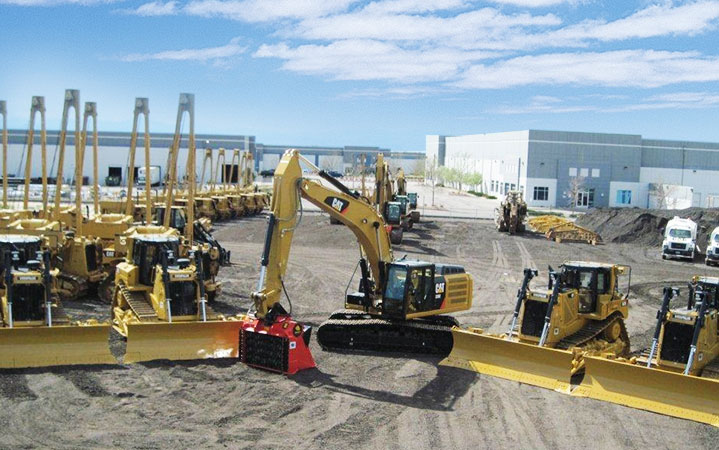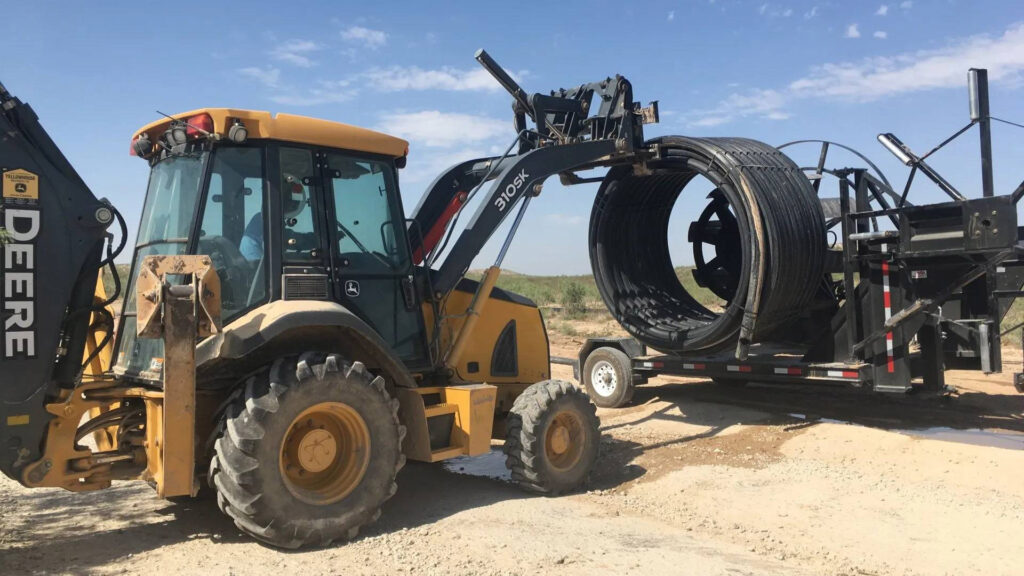Superior Oilfield Rentals oilfield: latest updates shaping production work
Wiki Article
A Comprehensive Overview to the Numerous Types of Oil Field Equipment and Pipeline Equipment Available
The oil and gas market depends heavily on customized tools for effective extraction and transport. Numerous types of equipment, from drilling rigs to storage space containers, play vital duties in this intricate procedure. Each piece of tools offers unique features that add to general functional success. Understanding these parts is crucial for anybody associated with the field. As the market progresses, so also do the modern technologies that sustain it. What advancements are on the horizon?
Drilling Rigs: The Foundation of Oil Exploration
Drilling rigs work as the vital equipment in the domain of oil exploration, enabling firms to access hydrocarbon gets hidden deep below the Planet's surface area. These rigs come in various kinds, consisting of land rigs, offshore rigs, and mobile units, each developed to operate in details atmospheres. Outfitted with advanced innovation, piercing rigs can penetrate geological formations with precision, making certain efficient resource extraction. The structural stability and functional capacities of these rigs are crucial, as they need to hold up against severe problems and considerable stress. The selection of a boring rig influences the overall task price and timeline, making it a vital consideration for oil companies looking for to optimize their exploration efforts and make best use of performance in their procedures.Pumps: Crucial for Liquid Activity
In the oil removal procedure, the function of pumps is significant, assisting in the motion of fluids throughout different stages of manufacturing. Pumps are essential for carrying petroleum, water, and other fluids from underground reservoirs to the surface area and after that with pipes to refineries. They can be found in different types, including centrifugal, favorable variation, and completely submersible pumps, each serving specific purposes based upon the liquid attributes and operational requirements. Centrifugal pumps are commonly utilized for their effectiveness in high-flow applications, while positive variation pumps master dealing with viscous liquids. The option of pump effects overall efficiency, functional safety and security, and upkeep expenses. Proper option and maintenance of pumps are crucial for enhancing production and reducing downtime in oil field procedures.Valves: Controlling Flow and Pressure

Valves play an important role in managing the flow and pressure of liquids within oil fields and pipes. Various sorts of valves offer unique applications, each created to satisfy certain features fundamental for efficient operation - Superior Oilfield Rentals oilfield. Understanding the characteristics and uses of these valves is essential for optimizing system performance and safety and security
Kinds of Valves
Necessary components in oil field procedures, valves play a vital function in managing the flow and pressure of liquids within pipelines and tools. Various sorts of valves are utilized to meet the diverse needs of oil and gas production. Common types include entrance shutoffs, which supply a straight-line flow and minimal stress decrease; globe shutoffs, recognized for their throttling capacities; and round valves, recognized for their fast on/off control. Furthermore, check shutoffs protect against heartburn, while butterfly shutoffs provide a light-weight option for regulating circulation. Each valve type is made with certain materials and arrangements to stand up to the severe problems usually discovered in oil fields, ensuring reliability and efficiency in procedures. Comprehending these kinds is important for efficient system management.Valve Applications and Features
While various kinds of valves serve distinctive functions, their main applications focus on regulating flow and stress within oil and gas systems. Valves such as entrance, world, and sphere shutoffs regulate fluid activity, making certain peak performance and safety and security. Gate shutoffs are frequently utilized for on/off control, supplying marginal flow resistance. World valves, on the other hand, deal exact flow policy, making them ideal for throttling applications. Sphere shutoffs are favored for their quick procedure and tight sealing capacities. On top of that, stress relief valves are critical for stopping system overpressure, protecting equipment stability. On the whole, the appropriate selection and application of shutoffs boost operational efficiency, making sure the reliable transport of oil and here gas with pipelines and handling facilities.Compressors: Enhancing Gas Transport
Compressors play a crucial function in the reliable transport of natural gas, making sure that it moves efficiently via pipelines over fars away. These gadgets boost the stress of gas, allowing it to get over rubbing and elevation changes within the pipeline system. Additionally, compressors facilitate the balancing of supply and need, accommodating changes in consumption and production prices. Various kinds of compressors are employed in the sector, consisting of centrifugal, reciprocating, and rotating screw compressors, each offering unique advantages based on the operational requirements. Normal upkeep of these compressors is vital to optimize performance and reduce downtime, ultimately contributing to a dependable gas transportation network. Their critical feature highlights the significance of compressors in the overall oil and gas facilities.Storage Tanks: Safe and Efficient Fluid Management
Effective transportation of natural gas counts on different sustaining systems, one of which is the appropriate monitoring of storage tanks. These tanks play a necessary duty in safely including liquids, ensuring that operational performance is maintained while lessening ecological threats. Constructed from sturdy materials, they are created to stand up to high pressures and harsh elements. Correctly sized and purposefully located, tank assist in the smooth circulation of all-natural gas and other liquids, avoiding traffic jams in supply chains. Regular upkeep and surveillance are imperative to discover leakages or structural issues, advertising safety and compliance with regulatory criteria. Eventually, the effective administration of tank is vital for the total honesty and integrity of the oil and gas industry's fluid handling systems.
Pipeline Solutions: Facilities for Transport
Pipeline systems work as the backbone of the oil and gas industry, assisting in the reliable transport of hydrocarbons over vast distances. These systems are composed of different parts, consisting of pipes, valves, pumps, and compressors, all carefully developed to ensure smooth circulation. The products made use of in pipeline building and construction, often steel or high-density polyethylene, are selected for durability and resistance to rust. Pipeline networks can cover throughout land and water, connecting production sites to refineries and circulation. Furthermore, progressed modern technology enables real-time tracking of circulation prices and stress levels, enhancing operational effectiveness. The critical positioning of these pipelines lessens ecological impact while maximizing resource availability, thereby playing a necessary duty in meeting energy demands around the world.Safety And Security Equipment: Ensuring Worker and Environmental Management
The operation of pipeline systems, while important for energy transportation, additionally provides substantial security difficulties for employees and the setting. Safety devices plays a significant role in reducing these threats. Individual safety tools (PPE) such as safety helmets, gloves, and non-slip shoes safeguards employees from physical hazards. Additionally, gas discovery systems check for leaks, ensuring that dangerous compounds do not present a threat to employees or the surrounding community. Emergency closure systems are vital for rapidly halting procedures throughout a crisis, protecting against possible disasters. Spill containment materials, including absorbents and obstacles, are basic for lessening ecological effect. On the whole, buying comprehensive safety tools is vital for maintaining operational stability and protecting both workers and the atmosphere in the oil and gas field.
Frequently Asked Questions
How Do I Choose the Right Oil Field Equipment for My Task?
Picking the ideal oil field equipment entails reviewing project specifications, budget restraints, and operational requirements. Take into consideration aspects such as equipment integrity, compatibility with existing systems, and the vendor's track record to guarantee peak efficiency and security.What Are the Maintenance Requirements for Oil Field Equipment?
Maintenance needs for oil field equipment consist of regular examinations, lubrication, and timely repairs. Operators must also stick to maker standards, screen performance metrics, and guarantee compliance with safety regulations to boost long life and performance.
Exactly How Can I Guarantee Conformity With Environmental Regulations?
To assure compliance with ecological regulations, companies must conduct regular audits, implement best practices, invest in training, maintain correct documents, and remain upgraded on regulation (Superior Rentals midland). Partnership with environmental agencies can additionally boost adherence to lawsWhat Is the Typical Lifespan of Pipeline Equipment?
The average life-span of pipeline equipment usually varies from 20 to half a century, depending on aspects such as worldly top quality, environmental conditions, and maintenance methods. Routine examinations can substantially affect longevity and operational efficiency.How Do I Safely Transfer Oil Field Equipment to Remote Locations?
Carrying oil field devices to remote places needs cautious planning, including route assessment, securing permits, using suitable cars, and guaranteeing security procedures are complied with. Appropriate training and communication among teams are vital for effective transport.Report this wiki page